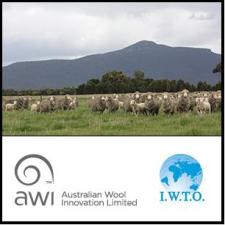Wool organizations from around the world have united to research the environmental credentials of this natural fibre. The starting point is the publication of a scientific report assessing existing wool Life Cycle Analyses (LCA).

The International Wool Textile Organisation (IWTO) has partnered with Australian Wool Innovation (AWI) to produce a better-informed assessment of the environmental attributes of wool. The research partnership will set the framework for confirming wool as the world's sustainable and accessible premium fibre for use in applications that include high end fashion, lifestyle and healthy, safe interiors.
IWTO President Peter Ackroyd comments: "Luxury brands and global retailers are constantly seeking assurances for their customers from suppliers on questions of provenance and sustainability. IWTO's mission in addition to its role as the custodian of the industry's manufacturing regulations and standards sees it as a priority to invest in the necessary research on Life Cycle Analysis."
Nine current Life Cycle Analyses (LCA) of wool through various stages of its production and use have been assessed for their value. All LCAs are available as published scientific papers or public reports and have recently been critically analysed by Dr Beverley Henry of the Queensland University of Technology. The scope, methodologies and assumptions contained within these reports have been assessed and Dr Henry has made recommendations in relation to the next steps towards creating acategorical study of wool's environmental credentials.
Head of the IWTO Environmental Credentials Working Group, Dr Paul Swan said all recommendations had advanced since being endorsed by the IWTO Executive Committee in May this year."Progress is being made towards being able to confirm wool's credentials as an environmentally friendly fibre. The LCAs produced so far cover a large number of producer countries, production environments, supply chains and products such as apparel, carpet and insulation. We must now consider the entire chain, from on farm production through to product recycling after the life of wool products." Dr Swan added.
IWTO is working through a process to encourage collaboration between wool LCA researchers around the world to ensure that data can quickly be aggregated, allocation methods resolved, data gaps filled and new comprehensive wool LCA data for carpet and apparel published.
AWI is currently funding on-farm research in which more on-farm data is collected including data on allocation methods and greenhouse gas emissions. Further research is conducted in the areas of the consumer phase, disposal and recycling.
Once the missing LCA data has been collected it is important to get the data to those who need it in their environmental assessment tools such as Made By or the Sustainable Apparel Coalition. Partnerships and working groups are currently being established with the relevant stakeholders within the field of apparel and carpets.
Elisabeth van Delden, IWTO Secretary General summarises: "We want to deepen our understanding of wool's environmental footprint and we want to make sure that our stakeholders recognise that we are committed to wool's environmental credentials and that wool is indeed not only a natural fibre but also a sustainable one."





